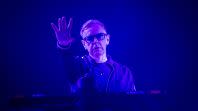There Would Be No Depeche Mode Without Andy Fletcher
- Oops!Something went wrong.Please try again later.
- Oops!Something went wrong.Please try again later.
- Oops!Something went wrong.Please try again later.
- Oops!Something went wrong.Please try again later.
The post There Would Be No Depeche Mode Without Andy Fletcher appeared first on Consequence.
Throughout his time with Depeche Mode, Andy “Fletch” Fletcher became accustomed to one question more than others.
“What exactly is it that you do?”
It was a fair query. Fletcher — who passed away Thursday (May 26th) at the age of 60 — was an enigma amidst bandmates with clearly-defined roles. Dave Gahan holds forth as lead singer. Martin Gore is the band’s primary instrumentalist and prolific composer. Even former members Vince Clarke and Alan Wilder had delineated responsibilities in the group’s operation.
Fletcher, however, was content to be “the guy that stands in the back.” Tall. Unassuming. Genial, even. Onstage he stood behind a keyboard but could appear as if he’d just happened to wander onto the set. He was the only band member with no songwriting credits, and at a certain point his vocal mic disappeared. Rolling Stone once wrote that “Andy Fletcher shows up for photo shoots and cashes the checks.” Hell, in D.A. Pennebaker’s 1980 Depeche Mode documentary 101, Fletcher himself said that “Martin’s the songwriter, Alan’s the good musician, Dave’s the vocalist and I bum around.”
Clearly, however, one doesn’t spend 42 years in a world class, Rock and Roll Hall of Fame band simply by bumming around.
“People who think Fletch doesn’t do anything are sorely mistaken,” Gore said some years ago. “We all have our roles; his just isn’t as obvious or as public as mine or Dave’s. But nobody should think that he doesn’t pull his weight. He absolutely does.”
Depeche Mode’s Martin Gore and Andy Fletcher Explain How to Save the World
Fletcher did stand up for himself a bit during a 2009 interview with Germany’s Die Welt, explaining to the publication that “the audience doesn’t really know which role which musician has within the group. But bands like Kraftwerk or Depeche Mode actually work as divisions of labor collectives. The contribution of each individual remains invisible. And because I don’t push myself to the fore, many mistake me for the fifth wheel.”
Fletcher was, in fact, instrumental in Depeche Mode’s formation. Growing up in Basildon, it was he and schoolmate Clarke who started bands called No Romance in China and Composition of Sound, with Fletcher playing bass. Together, influenced by Orchestral Manoeuvres in the Dark and others, they pivoted to electronic music, eventually recruiting Gore and, in 1980, Gahan.
But even in the early days, Fletcher downplayed his importance, telling Pulse! magazine in 1993, “It was accidental right from the beginning. I was actually forced to be in the band. I played guitar and I had a bass; it was a question of them roping me in.”
But there’s no question that Fletcher was an interested — and involved — party in Depeche Mode’s evolution, particularly able to articulate the group’s direction and approach. “We really don’t like doing conventional music,” he explained 1990, while the band was touring to promote its Violator album in 1990. “We just feel that a lot of it is regressive. That’s why we use electronics — that’s the way forward in the ’90s. It was a dirty word in the ’80s as a reaction to the early-’80s synth-pop thing. But we still feel that’s the way forward.”
That contention was certainly validated over the years. Depeche Mode has sold more than 100 million records worldwide, logging 54 entries on the U.K. Singles Chart. Six of its albums went platinum or better in the U.S., which also glommed onto hits such as “People Are People,” “Enjoy the Silence,” “Policy of Truth” and “Personal Jesus.”
“We want to try to appeal to as many people as possible,” Fletcher contended in 1990. “We don’t want to just stick to our narrow selves. We’re a song-based band. Martin writes traditional love songs, rock ‘n’ roll songs. We just use electronics instead of traditional instruments. We do believe our music should be heard by everyone.”
In 2009, meanwhile, he portrayed himself to Die Welt as the Depeche Mode member who stayed closest to the band’s original intent. “Within the band, I contribute the element of pop,” he explained. “Martin… loves American blues and country. And Dave has discovered jazz for himself. I, however, will probably eternally feel loyal to the simple pop melodies and the lightness they stand for.”
Fletcher’s greatest impact in Depeche Mode came behind the scenes. Though not outspoken about it, he focused on business concerns, including legal and marketing matters, and also periodically served as the group’s point person when it was in-between management. As the group became a trio following Wilder’s departure in 1995, Fletcher was also termed the “tiebreaker” and peacemaker between Gore and Gahan, helping to settle issues ranging from creative to commercial.
R.I.P. Andy Fletcher, Depeche Mode Founding Member Dead at 60
“Sometimes it’s frustrating not to be taken seriously,” Fletcher conceded to Die Welt. “After all, you could also say my job is the most important; without me there would be no band anymore. But it’s the same in big corporations — the people that do a good job in the background don’t get as much attention as the ones who’d get onto the microphone and announce the good quarterly figures.”
Announcing his death on Thursday, meanwhile, Depeche Mode gave some indication of how Fletcher was the band’s glue: “Fletch had a true heart of gold and was always there when you needed support, a lively conversation, a good laugh, or a cold pint.”
Being part of Depeche Mode and its success was, for Fletcher, “amazing, a dream come true,” and something he did not take for granted. If he himself was taken for granted by the audience, it was an unfortunate oversight, but perhaps one of his design. If Gore and Gahan choose to move forward, Fletcher’s contributions will perhaps become more obvious, and appreciated, in his absence than while he was alive.
— Depeche Mode (@depechemode) May 26, 2022
There Would Be No Depeche Mode Without Andy Fletcher
Gary Graff
Popular Posts
R.I.P. Andy Fletcher, Depeche Mode Founding Member Dead at 60
Eminem Shuts Down Pete Davidson's Final SNL Rap Video: Watch
Over 1,000 Musicians Pay Tribute to Taylor Hawkins with Cover of "My Hero": Watch
Rammstein's New "Dicke Titten" Video Pays Homage to Large-Breasted Women: Watch
R.I.P. Ray Liotta, Goodfellas and Field of Dreams Actor Dead at 67
Courtney Love Says Johnny Depp Saved Her Life After 1995 Overdose



